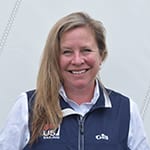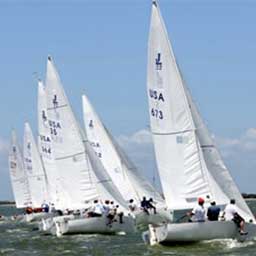If you are interested in hosting a course or seminar, complete the short form below!
A designated representative of the organization seeking to host a course is responsible for filling out the form below in its entirety. Please note the following:
-
- All instructor courses require the form to be submitted at least six weeks in advance of the requested course start date.
- Courses that have not met the necessary minimum enrollment at least 14 days prior to the course start date will be cancelled.
- While US Sailing tries to accommodate all requests, we cannot guarantee a course at your location.
Detailed information about the facility needs and expectations for hosting a course can be found below the form. If you have additional questions about hosting a course, please contact education@ussailing.org.
If the above form is not working or blocked, please click here for an alternative version.
Click the buttons below for more information on the host facility needs for each type of in-person course or seminar we offer:
Thank you for offering to host a US Sailing Small Boat course. Below are requirements for host facilities. If you meet all requirements, please complete the Host a Course Form online with information on your facility and requested course dates at least six weeks in advance of your requested dates:
BOATS AND EQUIPMENT
|
Sailboats, single or double-handed dinghies, with tillers and tiller extensions; enough for 8-12 people
|
|
|
Safety Boat
|
|
| Small marks with ground tackle - ideally 4 to 6 marks | |
| Line - three (3) lengths of six (6) foot line |
ON-SHORE
| Dedicated, well-lit and ventilated classroom with adequate tables and chairs | |
| Classroom and boats are to be no more than a 10-minute walk apart | |
| Whiteboard/Chalkboard with dry erase markers/chalk in three (3) colors | |
| Appropriate location for a water comfort check | |
| Restrooms (showers if possible) |
PRE-COURSE PREPARATION
| Provide Instructor Trainer with a copy of Emergency Procedures for site location | |
| Ensure all equipment is in good and working condition daily (this includes sails, lines, blades, safety boats, etc.) | |
| Prepare safety boat(s) each day (gas, anchor, and ground tackle) | |
| Adequate insurance coverage | |
| 1. Identify the Date, Host and Location a. The host organization must be a member of US Sailing. | |
| b. For approval and date selection, please contact your Area Race Officer (Race Management), Regional Administrative Judge (Judge) or Chair of the Umpires Committee. i. Advanced Race Management Seminars also require the approval of the Chair of the Race Officer Training Subcommittee. | |
1. Identify the Date, Host and Location a. The host organization must be a member of US Sailing.
b. For approval and date selection, please contact your Area Race Officer (Race Management), Regional Administrative Judge (Judge) or Chair of the Umpires Committee. i. Advanced Race Management Seminars also require the approval of the Chair of the Race Officer Training Subcommittee.
ii. Advanced Judge Seminars also require the approval of the Chair of the Judges Training Subcommittee.
2. Identify the Instructor a. Your ARO, RAJ or the US Sailing Race Administration office can help you with this.
b. You can find a list of US Sailing certified instructors on the US Sailing website.
c. Instructors are volunteers, but the host organization should offer to cover their travel and lodging expenses.
3. Finances a. US Sailing charges a standard registration fee of $35 per person for race officer, judge and umpire certification seminars (One Day Race Management Seminar, Advanced Race Management Seminar, One Day (Club) Judge Seminar, Advanced Judge Seminar, Umpire Seminar and Advanced Umpire Seminar).
b. US Sailing charges a standard registration fee of $10 per person for Continuing Education Roundtables.
c. US Sailing charges a standard registration fee of $15 per person for Judges Protest Day.
d. US Sailing no longer includes additional expenses, such as food and beverage or instructor travel, in the registration fee. The host organization may choose to absorb these additional expenses, arrange to collect an additional fee, or permit seminar participants to purchase food and beverages at the venue. You should not plan for
participants to leave the seminar venue for lunch – there is not enough time in the schedule.
e. If the host organization is an MVP program club, they may use MVP credits to offset the course fee. For details on how to do this, or to join the MVP program, please contact us at info@ussailing.org.
4. Complete and Submit the Host Form a. Please complete the Host a Course form as soon as possible.
b. You will need to know your organization’s member ID, which can be found on the Member/Organization Lookup page.
c. Once your host form has been submitted and approvals secured, the seminar will be posted as soon as possible on our seminar calendar.
d. We recommend opening registration as soon as possible.
5. Online Registration a. Participants must be members of US Sailing.
b. A discounted one-time only Special Introductory Membership is available to first-time members. To receive the $10 discount, these new members must join through the seminar enrollment process.
c. New members may immediately download The Racing Rules of Sailing in digital format. Paper rulebooks are also available for sale online.
6. Register Early a. Seminars do fill up, so we recommend registering as soon as possible. This allows students enough time to prepare and get the full benefit from the seminar.
b. Walk-ins are permitted only at one-day seminars. The organizer must make sure that each person who walks in registers online at the beginning of the seminar. Participants must register to receive seminar credit and online test credentials.
c. Advanced seminar registration closes three days before the first day to ensure students have enough time to prepare.
7. Optional Items for Purchase a. While registering for the seminar, participants will have the opportunity to purchase optional items. These items are not required for the seminar.
b. Orders are processed through the US Sailing Store and the items will be shipped directly to the registrant’s designated delivery location.
8. Registration Confirmation Email a. Registrants will immediately receive an email confirmation once they have submitted their registration form. This email contains links to student materials.
b. Students can also access the materials directly from our website.
9. Course Roster a. Only the instructor has direct access to the course roster in order to protect the privacy of our members, including minors.
b. The instructor may share portions of the roster with the host to help with preparation for the seminar. Please treat the information as confidential.
10. Contact Participants a. The organizer and/or instructor will email the participants about one week prior to the seminar with venue-specific details and reminders about downloading student materials.
b. Email templates are available on the instructor’s online site and email addresses are available from the course roster.
11. Online Testing a. Testing opens at 1700 (Eastern) on the last day of the seminar. Participants will receive an email with information and the test link shortly before the seminar.
b. All seminars have a four-week test window. Please reinforce with participants that they must complete the test during the test window (think of it like protest time).
c. Walk-in participants will be registered for the online test after they complete the online registration. The organizer is responsible for ensuring that walk-in participants register online when they arrive.
d. Online testing is required for anyone seeking certification, and recommended for all.
12. Test Scores a. Test-takers receive immediate feedback and their score as soon as they submit their test. The instructor also receives participant’s test score.
b. Scores are posted to the member’s SOARS account after the test period ends.
c. For retest policies, please contact raceadmin@ussailing.org.
13. Questions or Problems? Please call (1-800-877-2451) or email (education@ussailing.org).
Thank you for offering to host a US Sailing Basic Keelboat Instructor Certification Course! Below are the requirements for host facilities. If you meet all requirements, please complete the Host a Course Form above with information on your facility and requested course dates at least six weeks in advance of the requested dates.
BOATS AND EQUIPMENT
Keelboats
|
| Three or four lengths of line between 8 and 10 feet for knot tying |
| One 60 foot line for heaving and coiling |
| VHF Radios - minimum one per boat |
ON-SHORE FACILITIES
| Dedicated, well-lit and ventilated classroom with adequate tables and chairs |
| Classroom and boats are to be no more than a 10-minute walk apart |
Whiteboard/Chalkboard with dry erase markers/chalk in at least three colors
|
| Restrooms |
PRE-COURSE PREPARATION
| Provide Instructor Trainer copy of Emergency Procedures for site location |
| Ensure all equipment is in good and working condition daily (including but not limited to sails, lines, etc.) |
| Prepare boats each day (fuel, etc.) |
| Adequate insurance coverage |
Questions? Please contact the US Sailing Adult Department: Adult@USSailing.org
Thank you for offering to host a US Sailing Safe Powerboat Handling Instructor Course! Below are the requirements for host facilities and equipment needed. If all requirements are met, please complete the Host a Course Form above with facility information and course date requests at least six weeks in advance of the requested dates.
BOATS AND EQUIPMENT
Powerboats
|
| First aid supplies and all USCG Required Equipment |
| Four (4) race-type buoys/marks with tackle and anchors |
| Extra lines of adequate length for towing |
| VHF Radios - minimum of one per boat |
ON-SHORE FACILITIES
| Dedicated, will-lit and ventilated classroom with adequate tables and chairs |
| Classroom and boats are to be no more than a 10-minute walk apart |
| Whiteboard/Chalkboard with dry erase markers in at least three colors |
| Restrooms |
PRE-COURSE PREPARATION
| Provide Instructor Trainer with a copy of Emergency Procedures for site location |
| Ensure all equipment is in good and working condition daily |
| Prepare boats each day (gas, anchor, marks, and ground tackle) |
| Adequate Insurance coverage |
Questions? Please contact the US Sailing Adult Department: Adult@USSailing.org
ADAPTIVE SAILING WORKSHOP REQUIREMENTS
BOATS AND EQUIPMENT:
_____ Ideally, one Keelboat (or stable centerboard boat available for every three candidates (14-24 ft., sloop-rigged, tiller or joystick steered)
_____ Twelve 2 ft. lengths of line for knot-tying
_____ One safety boat (ideally center console that can tow a boat if necessary)
COURSE PREPARATION:
_____ Procedures for emergencies at site location
_____ Check condition of equipment before course (equipment in good condition is key
to hosting a successful course – please be sure that boats are in good shape)
_____ Check condition of equipment after course; arrange for repair of any damage
ON-SHORE FACILITIES:
_____ Reservation of “classroom”; well-lighted and ventilated for classroom purposes
_____ Chalkboard with chalk and eraser or whiteboard with dry markers in 3 colors
(board should be a minimum of 4’x6’) or flipchart with “stick up” pages
_____ Table and chairs for each participant plus several extra chairs
_____ LCD projector and screen (really helpful but not deal breaker)
_____ Restroom facilities nearby
_____ A Hoyer-type lift and/or transfer box (if at all possible on site)
MISCELLANEOUS:
_____ Arrangements for low cost lunches so participants can purchase (or bring their own) and eat together at course site
_____ Site to provide materials for building a transfer box on site during the course (according to provided plans from US Sailing) along with the tools to construct it.
Thank you for offering to host a US Sailing Keelboat Cruising Instructor Certification Course! Below are the requirements for host facilities and equipment. If you meet all requirements, please complete the Host a Course Form above with information on your facility and requested course dates at least six weeks in advance of the requested dates.
BOATS AND EQUIPMENT
One Sailboat (more if needed) larger than 34 feet equipped with:
|
| Dinghy with oars |
| Adequate Toolkit - spare parts, electrical filters, tools |
ON-SHORE FACILITIES
| Dedicated, well-lit and ventilated classroom with adequate tables and chairs to accommodate 8 candidates and 2 Instructor Trainers for Day Meetings and Discussions, Day 3 Interviews, and Day 4 Coastal Navigation Exams |
| Restrooms |
PRE COURSE PREPARATION
| Provide Instructor Trainer with a copy of Emergency Procedures for site location |
| Contact Instructor Trainer to review course schedule, provisioning plans, any necessary charter fees |
| Ensure all equipment is in good and working condition daily |
| Check condition of equipment after the course; arrange for repair of any damage. If there is damage from the course, you must make the IT aware of it immediately |
| Adequate insurance coverage |
Questions? Please contact the US Sailing Adult Department: adult@USSailing.org
Thank you for offering to host a US Sailing Cruising Powerboat Instructor Course! Below are the requirements for host facilities and equipment. If you meet all requirements, please complete the Host a Course Form above with information on your facility and requested course dates at least six weeks in advance of the requested dates.
BOATS AND EQUIPMENT
| Powerboats - two(2) between 26 and 50 feet, one single screw and one twin screw, at least one equipped with a bow thruster. Each boat should be equipped as follows: |
|
ON-SHORE FACILITIES
| Dedicated, well-lit and ventilated classroom with adequate tables and chairs for day meetings, discussions, and Day 3 Exit Interviews |
| Whiteboard/Chalkboard with dry erase markers/chalk |
| Restrooms |
PRE-COURSE PREPARATION
| Provide Instructor Trainer with a copy of Emergency Procedures for site location |
| Contact Instructor Trainer to review course schedule, provisioning plans, any necessary charter fees |
| Ensure all equipment is in good and working condition and prepare boats each day (fuel, etc.) |
| Check condition of equipment after course; notify IT immediately of any new damage and arrange for repairs |
| Adequate insurance coverage |
Questions? Please contact the US Sailing Adult Department: adult @USSailing.org
Host Partner Program
In an effort to recognize organizations that help US Sailing host instructor training courses, we offer a Host Partner Program.
Any organization that holds two full Reach or Small Boat courses in a calendar year (January 1-December 31) will get a free spot in one of those courses in the following year. The same goes for any organization that holds two full courses in either the Powerboat or Keelboat disciplines.
Hosts that have received a free spot will be notified by the end of the following January.
Here’s what’s required:
Adult Courses (Powerboat/Keelboat) - 14 students= 1 space.
Youth Courses (Small Boat/Reach) - 24 students= 1 space.
Details:
- In-house courses are excluded from consideration.
- Courses cannot be used across discipline (example: Reach/Small Boat headcount cannot be applied to Keelboat course).
- Course credits must be used within the year they were issued.
- At this time, we cannot carry over attendance numbers from one year to the next.
If you have additional questions, please contact education@ussailing.org.








